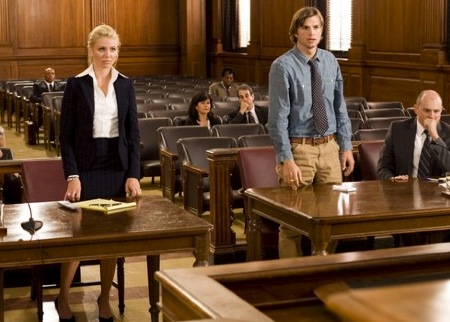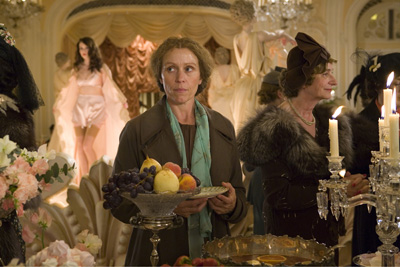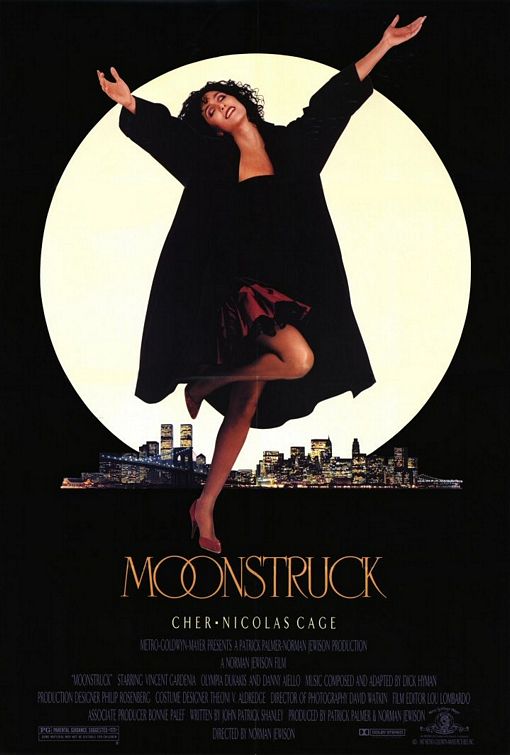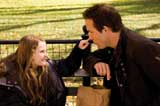A romantic comedy needs to get us on the side of its couple as individuals and on the side of romance. This one fails by giving us characters so crude and unlikeable that even the star wattage of Cameron Diaz and Ashton Kutcher cannot make us care. Most of the movie centers on their attempts to torture each other during a six-month court-ordered period of living together and marital counseling (from Queen Latifah, whose no-nonsense diagnosis of what is wrong should have been applied to the screenplay). The audience may feel that they are being tortured as Joy (Diaz) and Jack (Kutcher) battle over sweaty socks and whether the toilet seat is left up.
 Joy is humiliatingly dumped by her fiancee (SNL’s Jason Sudeikis) in front of all of their friends. Jack is fired by his father (Treat Williams) for not taking the job seriously. They meet when they both take off for Vegas to get away from their disasters. So, of course, they create an even bigger one. They get completely drunk and wake up the next morning married. They quickly agree to an annulment until they win a $3 million jackpot. A judge (Dennis Miller) orders them to live together (“I sentence you to six months hard marriage”) to try to make the marriage work before he will decide how to allocate the money. And so Joy and Jack scheme to get each other to give up, then to give cause for divorce by cheating. And then, just as they begin to appreciate each other, there is time for one more setback.
Joy is humiliatingly dumped by her fiancee (SNL’s Jason Sudeikis) in front of all of their friends. Jack is fired by his father (Treat Williams) for not taking the job seriously. They meet when they both take off for Vegas to get away from their disasters. So, of course, they create an even bigger one. They get completely drunk and wake up the next morning married. They quickly agree to an annulment until they win a $3 million jackpot. A judge (Dennis Miller) orders them to live together (“I sentence you to six months hard marriage”) to try to make the marriage work before he will decide how to allocate the money. And so Joy and Jack scheme to get each other to give up, then to give cause for divorce by cheating. And then, just as they begin to appreciate each other, there is time for one more setback.
Screenwriter Dana Fox was also responsible for “The Wedding Date,” which suffered from a similarly ugly premise. Romantic comedies can be sexy, even naughty, but they have to have a charm and buoyancy that is quickly deflated by crude, gross humor. It makes the main characters unlikeable. There is no reason to believe in either their enmity or their growing affection so we never connect to them or care about the outcome. It is supposed to be endearing that this couple gets blind drunk and gets married, that he pees on the dirty dishes in the sink and removes the bathroom door to annoy her, that she shows a cab driver one breast (she negotiates him down from two) to get a free ride. It is not. It is supposed to make sense that Jack’s vulgar jokes endear him to the executives at Joy’s company. It does not. We are supposed to see why Joy and Jack begin to care about each other. We don’t. It isn’t funny enough and it isn’t romantic enough. In other words, what should have stayed in Vegas is this movie.
 A delicious retro romp about a failed nanny who finds her true calling when she transforms the life of a flighty singer, this film is designed around two fabulously entertaining stars, Frances McDormand and Amy Adams.
A delicious retro romp about a failed nanny who finds her true calling when she transforms the life of a flighty singer, this film is designed around two fabulously entertaining stars, Frances McDormand and Amy Adams.
 Joy is humiliatingly dumped by her fiancee (SNL’s Jason Sudeikis) in front of all of their friends. Jack is fired by his father (Treat Williams) for not taking the job seriously. They meet when they both take off for Vegas to get away from their disasters. So, of course, they create an even bigger one. They get completely drunk and wake up the next morning married. They quickly agree to an annulment until they win a $3 million jackpot. A judge (Dennis Miller) orders them to live together (“I sentence you to six months hard marriage”) to try to make the marriage work before he will decide how to allocate the money. And so Joy and Jack scheme to get each other to give up, then to give cause for divorce by cheating. And then, just as they begin to appreciate each other, there is time for one more setback.
Joy is humiliatingly dumped by her fiancee (SNL’s Jason Sudeikis) in front of all of their friends. Jack is fired by his father (Treat Williams) for not taking the job seriously. They meet when they both take off for Vegas to get away from their disasters. So, of course, they create an even bigger one. They get completely drunk and wake up the next morning married. They quickly agree to an annulment until they win a $3 million jackpot. A judge (Dennis Miller) orders them to live together (“I sentence you to six months hard marriage”) to try to make the marriage work before he will decide how to allocate the money. And so Joy and Jack scheme to get each other to give up, then to give cause for divorce by cheating. And then, just as they begin to appreciate each other, there is time for one more setback.
 “Definitely, Maybe” is the story of the three great loves of a man’s life. That’s “story” in the literal sense, as in the bedtime story he tells his young daughter, who wants to know how he met her mother and, implicitly, why they are getting divorced.
“Definitely, Maybe” is the story of the three great loves of a man’s life. That’s “story” in the literal sense, as in the bedtime story he tells his young daughter, who wants to know how he met her mother and, implicitly, why they are getting divorced.